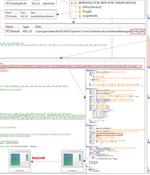Security News

The defense sector in Ukraine and Eastern Europe has been targeted by a novel. NET-based backdoor called DeliveryCheck that's capable of delivering next-stage payloads.

The Spanish National Police has apprehended a Ukrainian national wanted internationally for his involvement in a scareware operation spanning from 2006 to 2011. "The operation has been carried out by investigators from the General Information Police Station in coordination with the Provincial Information Brigades of Tenerife and Barcelona and with the El Prat Airport Police Station," a Spanish National Police press release published on Saturday reads.

A threat group tracked as APT28 and linked to Russia's General Staff Main Intelligence Directorate has breached Roundcube email servers belonging to multiple Ukrainian organizations, including government entities. In these attacks, the cyber-espionage group leveraged news about the ongoing conflict between Russia and Ukraine to trick recipients into opening malicious emails that would exploit Roundcube Webmail vulnerabilities to hack into unpatched servers.

Microsoft linked Cadet Blizzard to Russia's GRU military intelligence unit. "Cadet Blizzard seeks to conduct disruption, destruction, and information collection, using whatever means are available and sometimes acting in a haphazard fashion," they wrote.

The Russian threat actor known as Shuckworm has continued its cyber assault spree against Ukrainian entities in a bid to steal sensitive information from compromised environments. Targets of the recent intrusions, which began in February/March 2023, include security services, military, and government organizations, Symantec said in a new report shared with The Hacker News.

Squad claimed an attack that took down Russian telecom provider Infotel JSC on Thursday evening. Among other things, Moscow-based Infotel provides connectivity services between the Russian Central Bank and other Russian banks, online stores, and credit institutions.

The Computer Emergency Response Team of Ukraine has warned of cyber attacks perpetrated by Russian nation-state hackers targeting various government bodies in the country. The email messages come with the subject line "Windows Update" and purportedly contain instructions in the Ukrainian language to run a PowerShell command under the pretext of security updates.

The Computer Emergency Response Team of Ukraine says Russian hackers are targeting various government bodies in the country with malicious emails supposedly containing instructions on how to update Windows as a defense against cyber attacks. Instead of legitimate instructions on upgrading Windows systems, the malicious emails advise the recipients to run a PowerShell command.

The Ukrainian cyber police have arrested a 36-year-old man from the city of Netishyn for selling the personal data and sensitive information of over 300 million people, citizens of Ukraine, and various European countries. The seller was using Telegram to promote the stolen data to interested buyers, asking between $500 and $2,000 depending on the amount of data and its value.

Ukrainian cops have arrested two suspects and detained 10 others for their alleged roles in a cybercrime gang that used phishing scams and phony online marketplaces to steal more than $4.3 million from over 1,000 victims across Europe. Police say the victims come from several European countries including the Czech Republic, Poland, France, Spain, Portugal.